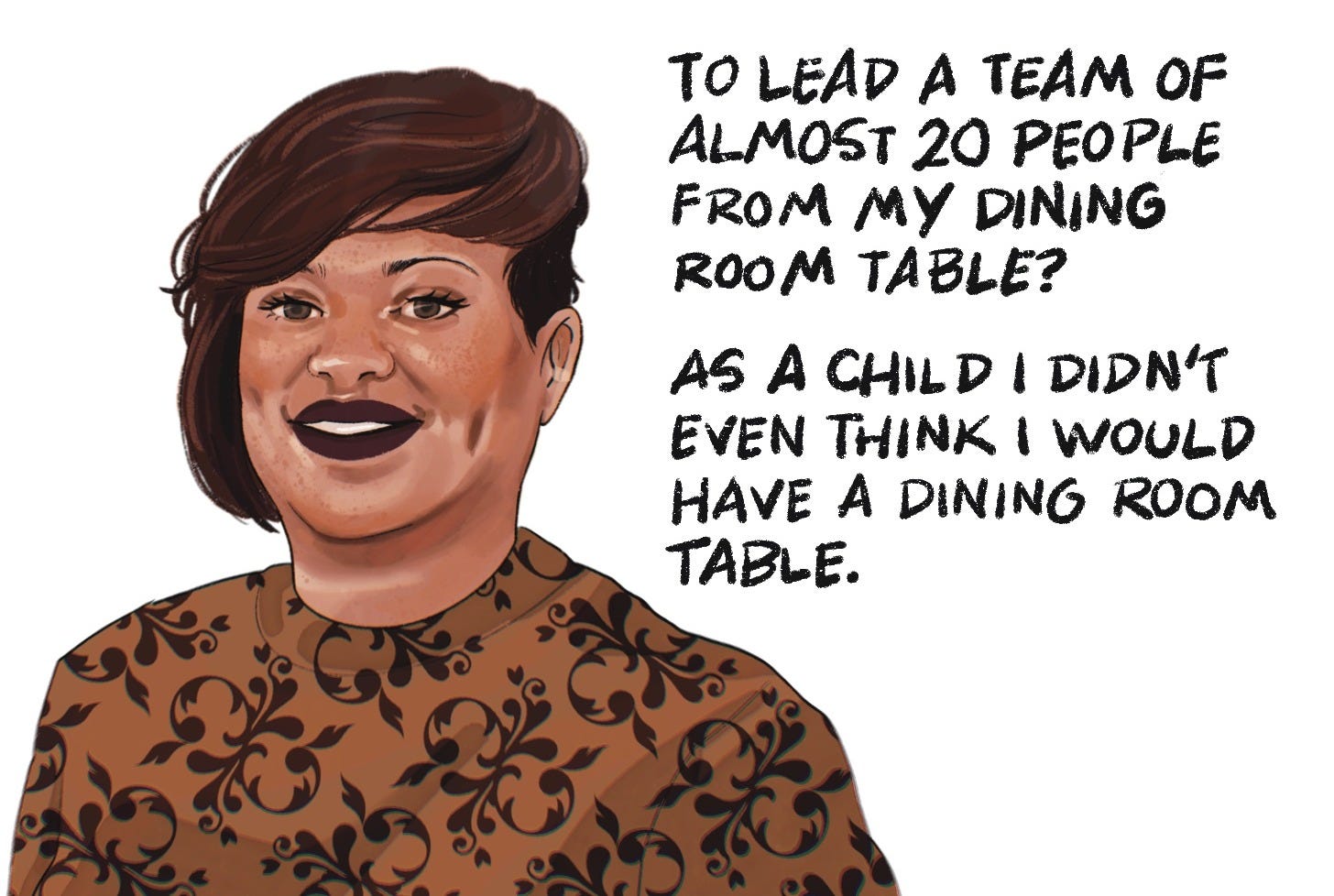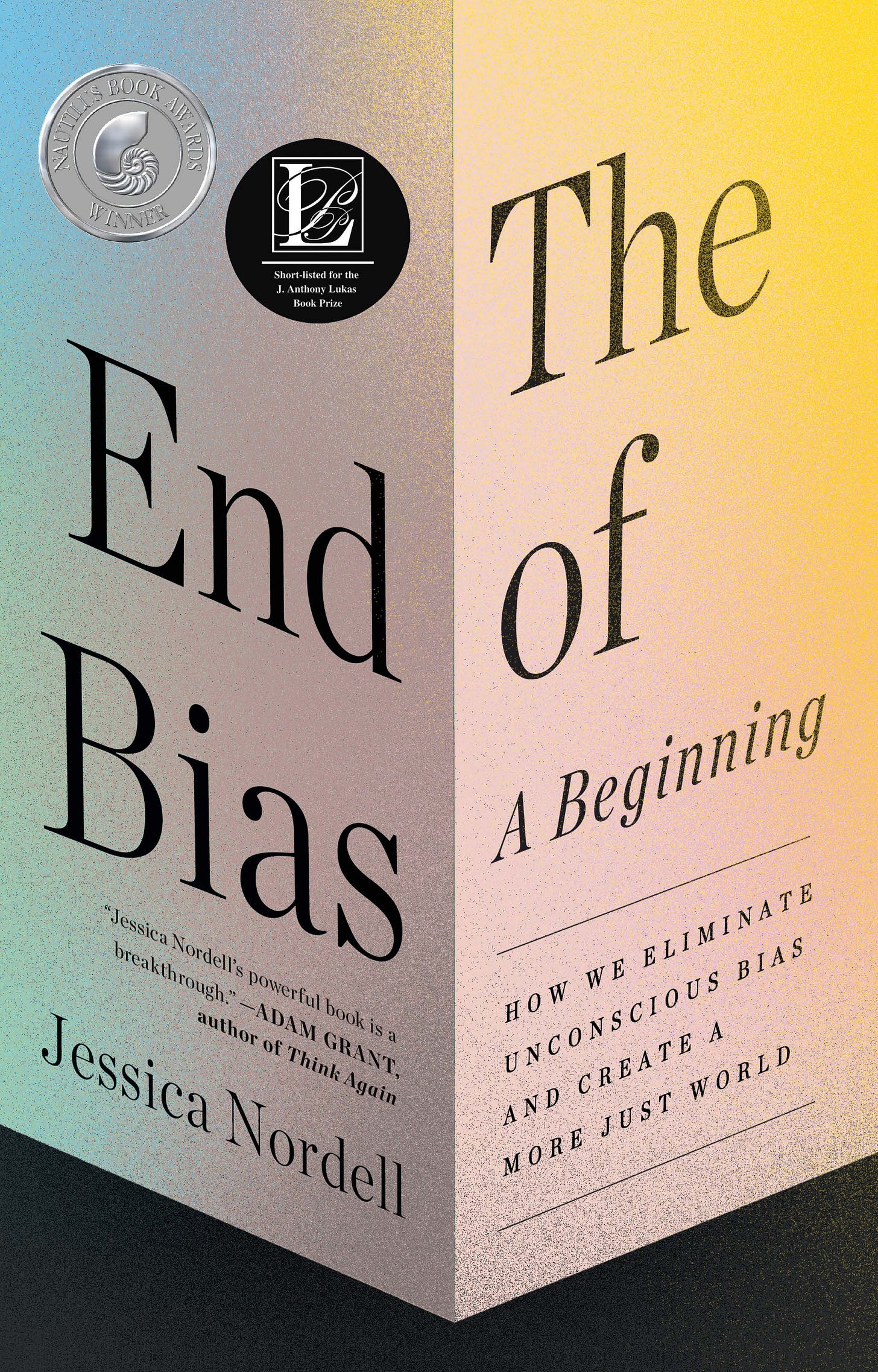The Joyous, Lonely, Personal Road Out of Homelessness
What it takes to break a pattern and change a life
Dear friends,
Portia Jackson, Director of Programs and Services for Habitat for Humanity in the Twin Cities, understands homelessness with every fiber of her being. As a kid in Indiana, she slept on neighbors’ porches, friends’ couches, and pallets on the floor. At 12, she moved to Minneapolis, where her family bounced from apartments to homeless shelters and hotels. By 7th grade, she'd attended 15 schools. Finally, as a young mom, she connected with an organization that helps mothers experiencing poverty. The Jeremiah Program launched her on a path out of homelessness. She’s a homeowner now, with a master’s degree and a team of nearly 20. We spoke about what it takes to change a pattern and change a life.
Jessica: Your experience with homelessness really began in Minnesota. But you started out in Indiana. How did you end up moving here?
Portia: The crazy thing is, my mom had a map, and she closed her eyes and put her finger on it and landed on Minneapolis. We got in our station wagon and came to Minnesota. In Indiana, sometimes we would be in our own place, or I'd be living with my grandparents or my father or my father's ex-wife.
My mother was highly mobile. If she was between places, there would be a long time that I wouldn't hear from her. Then she'd come back.
When we moved to an entirely different state, with nobody, we were just with my mom and bouncing wherever she lands.
What factors do you think led to the instability?
Inability to pay the rent in full or on time, coupled with substance abuse issues. I don't think we ever stayed anywhere more than a year. When I say highly mobile, I mean highly mobile. We never had to stay in a car, but pretty close to it.
Once I was pregnant with my daughter at 16, I was like, "I don't want this for her."
What did "home" mean to you at that time, when you were moving so frequently?
Home wasn't really a place. Home was with my mom and sister. Bouncing around, you don't get accustomed to an environment, just to the people you're with.
Do you remember a specific moment when you realized, "I don't want this for my child"?
I was pregnant in a teen shelter. You can only come in after a certain time, you have to leave by a certain time. I was in high school. Eight months pregnant, having to do that every day, even on weekends.
My mom got an apartment before I gave birth. So I moved there. Again, issues with paying the rent. I was like, "I've got to do something." I started reaching out to some nonprofits that focused on teen homelessness. They've merged; now it's called YouthLink. The case manager got me to my first apartment in South Minneapolis. One bedroom. I paid $485 a month.
We all work to get to self-actualization, but I wasn't even in the pyramid yet.
How did it feel to have your own place under your own name?
It felt good, but I realized the financial burden it is to have a place of your own without any assistance. I mean, $485 sounds like a really good deal, but in 1999— making $11, $12 an hour— it was a struggle. I ended up moving back with my mom. We became homeless again. We had to live in a hotel for a while, which scarred me for life. I don't even like going to hotels now.
Why? What happened?
We had to re-voucher every few days.
So every few days, you weren’t sure where you’d be living.
Every few days. I was at my wit's end. By that time I had two kids and my sister and my mom living in that room. I said, "I cannot do this anymore."
I applied for the Jeremiah program and started the process. It took months to get in. I went to every meeting. I was so thankful. I got this apartment. The daycare is right downstairs. My school MCTC was across the street. My rent was subsidized.
I felt like a million pounds was lifted off my shoulders.
Tell me more about the arrangement with the Jeremiah program.
As long as you were active and working your plan, then you could stay. You have to be involved in some post-secondary education. Children attend the enrichment center onsite. Now you got food, somewhere to stay that's safe. You can work up Maslow's hierarchy of needs. We all work to get to self-actualization, but I was at the bottom. I wasn't even in the pyramid yet.
They started this "empowerment curriculum" that is really powerful. You look at core hurts, acknowledge that, move forward.
It sounds like the Jeremiah Program is attuned to the fact that you could have the foundation of the Maslow pyramid— food, safety— but if you still have some deep unresolved hurt, you could end up never going up the pyramid. You could get stuck.
You could, yeah.
What is the goal of that empowerment work, in your mind?
To be able to say, "There were things I was exposed to that caused me to view life with this lens. There's another way to view it." I didn't know that before. I didn't know it wasn't my fault.
And to have that aha moment: I was subjected to a lot for many years, and that does affect me now, but it doesn't have to continue to. I can heal from it, understand it, and check for that when I'm making decisions: "I'm making this decision out of survival, but I'm not in the lion's mouth anymore."
The sense that if it goes wrong, everything falls apart? It's not like that anymore. If it doesn't work, I can pivot and do something else.
Everybody is not successful in the program. It's not easy.
You're not going towards the path of least resistance. You're going towards the path with lots of fucking resistance.
The work you're describing— seeing where you came from and how it affected your path up to now, and also that you don't have to carry that forward—that's hard work.
And the really hard part about that, Jessica, is that when you realize that, and you take off ramp to somewhere else, the people you're used to don't always come with you or support it. They sometimes feel like you're threatening them by taking a different path.
You're not going towards the path of least resistance. You're going towards the path with lots of fucking resistance.
Yes.
I mean, at some point I was working two full-time jobs at the same time and getting my master's, with five kids-- one in college, two in diapers. I don't recommend that.
I knew that I had a lot to offer, but I also knew I needed those credentials for people to take me seriously. As a Black woman, you have to do twice as much to get half as much. I understood early that I'm going to have to dig in deep just to get to mundaneness.
The ability to sit at my kitchen table to talk to you because I work from home? This is wealth right here.
The ability to sit at my kitchen table to talk to you because I work from home? This is wealth right here. To be able to lead a team of almost 20 people from my dining room table? As a child I didn't even think I would have a dining room table. Never thought I'd lead anything. Never knew I would work for an organization that does the great work that we do. People dream about traveling the world. I want that, too. But this right here? It was hard.
It sounds incredibly hard.
When I was a kid, I had horrible migraines. I'm talking 9, 10 years old. The doctor didn't know why. I was stressed out with adult problems as not even a preteen— as a kid. And it manifested physically.
Of course.
Now I don't need the highs. I'm trying to prevent the lows. I just want to enjoy my peace.
You said one of the challenges of creating a new kind of life for yourself is that people from your old life may feel threatened. What was your experience of that?
I'm sorry, I'm getting emotional. <Tears up> It was lonely.
Yeah.
It was lonely and nobody fully understood it. I missed out on a lot. I'm okay with that. But a lot of people aren't around, or I don't have the close relationships I did before. I always try to make sure that I've never made anybody feel, "I'm better than you."
I'm not better than you. I just chose to do something different. I did not want my kids to have to deal with undue stress— worry about what they're going to eat tomorrow, where they're going to lay their head tonight.
I'm remembering a conversation with a friend who had a really challenging childhood. He got out of it. He has a house, a family, a career— he's doing great. But he said he had to unfortunately cut contact with his family.
He said, "It's like I'm in the water, and I'm holding onto a piece of wood trying not to drown. And my family is grabbing my ankles, trying to pull me under."
Yeah.
He said, "The only way I'm going to not drown is to have them not grabbing my ankles."
I totally can relate to that. I might not have cut people completely off, but I know how to engage. It's more important for the family that I created to be able to prosper in whatever way is important to them.
I am attempting to cultivate an environment where my kids do not have to act out of survival. They can act out of passion, out of purpose. They can do something that makes them happy. I tell them, "You're not going to be happy all the time, but I want you to feel fulfilled. Maybe it's challenging, but you are up for the challenge."
I was willing to sacrifice to provide that. But also make sure I was present enough that they could say, "My mom came to this. She supported me when I was going through that." It's so hard.
You sound like an amazing mom. I wish everyone could have a mom like you.
I appreciate that. My oldest daughter is 27. She is an entrepreneur; she owns her own business.
My second daughter works for the Minneapolis public schools. My third daughter is in college studying criminal justice. And I have the twins in fifth grade. One is the sweet nerd and the other one's the jock, but he got some nerd tendencies, too. <Laughs.> Totally different kids.
You have a really unique perspective on housing and homelessness. What do you wish more folks understood?
You have to understand what people want. Just because you see somebody living outside-- in an encampment or a tent off the highway-- does not mean that they want to live inside. We all tend to think we know what's best for people other than ourselves.
I remember hearing someone say that one of the things they liked about being in an encampment was a sense of community. In a shelter, they'd be all alone. They preferred to be outside with other people.
Some people just cannot wrap their heads around that. Folks should talk to people experiencing this and figure out how to assist in a way that's meaningful to them. It's tedious. It takes a person-centered trauma-informed approach, but that's what you need to do.
What solutions would be meaningful?
One of the biggest things is the benefits cliff. You have benefits, and you're told you need to work. Okay, you find a good job. All of a sudden you're not eligible for anything anymore. Your childcare is gone, your healthcare is now astronomical.
There should not be a cliff. There should be a bridge to get you to the other spot as ready as possible.
Because you've exceeded the income limit.
Yes. Now everything falls on you, your paycheck. If you got two or three kids, daycare is really an issue. Housing is really an issue.
Someone could get off benefits and go into a career, but give them a guaranteed income for a year. Make sure they have childcare. Pay for their medical premiums for a year so they can stand up and be ready to do these things themselves.
Have them participate in financial empowerment, so they have the tools to look at their income and say, "This percentage goes towards my emergency fund." People need support in figuring out how to maintain and how to grow.
There should not be a cliff. There should be a bridge to get you to the other spot as ready as possible. Don't make them start on shaky ground.
Is part of the issue having the confidence to know, "I'm going to be okay even after the benefits disappear?"
It is confidence, but also, if you have nobody around you to model the thing that you're trying to do, it's scary as hell. Because at that point it is all on you. If you lose that job or a kid gets sick, you cannot go back. Good luck trying to get Section 8 [rent assistance] again if you're ever off. There are things that could happen to put you back to a worse case than you were before.
The fear is based in the reality.
Yes. It's not fear of an unknown thing. I know what will happen if I lose my job.
Is there anything else you think it's important for people to know about housing and homelessness?
When we talk about homeless or unhoused people, we're not just talking about the people that you see in the street. Doubling up, having 16 people in the 2-bed? That's precariously housed. They are working 40 hours a week. They are not visible. The gap between income and adequate, safe housing just keeps growing.
There's a great number of people you wouldn't even know are homeless. When I was homeless in high school, I came to school fresh every day, living in a shelter for seven months. Don't let what you see fool you.
I worked at a food shelf at a university a few times. Some students came for free goodies but some clearly really needed the food. They didn’t make eye contact. It was startling.
Yeah. The people you see on the street with signs— that's the tip of the iceberg.
What do we need to do? Build more housing, build in more affordable areas further out of cities?
All of it has pros and cons. I used to work for a county. We funded a lot of housing projects. The city says, "If you're going to build, some percentage of that construction has to be affordable for the next 20 years." They don't give you a number. They just say "affordable." So private developers would come ask us for money, a substantial amount.
Say I'm a developer building a hundred units, and 10% are going to be "affordable." To me that means people making 50% AMI [area median income] pay 50% of their income towards housing. People who make $2000 a month pay $1000 to live here. And I would like the county to give me $450,000 to pay for those units and bridge the gap between that $1000 and what I'd get from a market rate renter.
This is what I need to get 10 units. And this is just for the next 20 years.
And honestly, when you gross $2000, you bring home maybe $1500. So of course you're going to try to get a roommate they don't know about.
It's a drop in the bucket, compared to the problem.
I live near what used to be a housing project. They tore it down in the 1990s and gave folks vouchers. Some stayed in the city; some went to the suburbs. For some people it was great. For people without a car, how were you going to live in the suburbs in the 1990s? Now we have a beautiful community here, mixed income. But what's the story for all the people who got displaced?
It seems like you have job security. The issue is gigantic.
I'm happy to be in this space, from emergency shelter all the way to home ownership. I have participated in all of those and have done work in all of those. So I get it, but I also get where the numbers come from.
I do the bit that I can. Every single closing, I celebrate. That's one family, and it's made a difference. Because I know it made a difference for me.
This newsletter is free, so please forward to someone who might enjoy it. The End of Bias: A Beginning, my book about how people have reduced bias and become more fair, just, and humane, is now out in paperback.







This is a powerful, insightful, and moving piece. Thank you, Jessica. A reminder to pray that we are ready whenever an opportunity to help someone comes our way.
Thank you for this eye-opening and heart-expanding interview. Portia is an inspiring human doing amazing work!